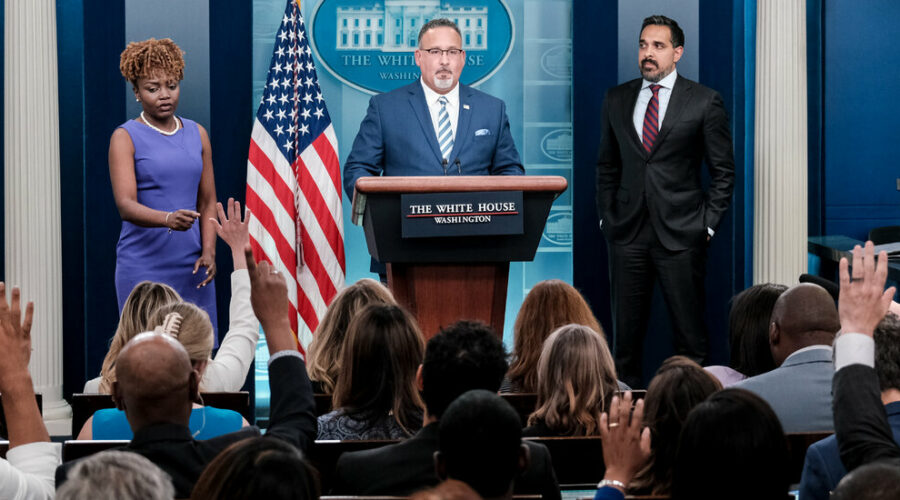Biden Vows to Pursue Student Debt Relief With a Different Law
Even as he denounced the Supreme Court ruling striking down his student debt forgiveness program and blamed Republicans for going after it, President Biden said Friday that his administration would start a new effort to cancel college loans under a different law.
The law Mr. Biden cited, the Higher Education Act of 1965, contains a provision — Section 1082 of Title 20 of the United States Code — that gives the secretary of education the authority to “compromise, waive, or release any right, title, claim, lien, or demand, however acquired, including any equity or any right of redemption.”
Some proponents of student debt relief had proposed that the Biden administration invoke this law as the basis of the president’s original loan cancellation program. In February 2021, for example, a group of Democrats including Senators Elizabeth Warren of Massachusetts and Chuck Schumer of New York, the majority leader, introduced a resolution urging that step.
But as the Covid-19 pandemic swelled, the Biden administration instead used a law giving the secretary of education power to “waive or modify” federal student loan provisions in a national emergency. (A law passed by Congress to address the pandemic, the HEROES Act, may have made that route more attractive to policymakers, because it also exempted some agency actions from the usual rule-making and notice-and-comment processes.)
On Friday, in a lawsuit brought by Republican-controlled states, the six Republican-appointed justices ruled that the administration had stretched that law too far.
Should Mr. Biden’s new plan face a similar lawsuit, as seems likely as a matter of political reality, it would ultimately come before the same Supreme Court — raising the question of whether the wording differences between the statutes will make any difference.
In the majority ruling, Chief Justice Roberts said the words “waive or modify” could not be legitimately interpreted as conferring the power to cancel debt at a massive scale, and he invoked a conservative doctrine that courts should strike down agency actions that raise “major questions” if Congress did not clearly and unambiguously grant such authority.
While Mr. Biden said he thought the Supreme Court on Friday had gotten the law wrong, he maintained that the new approach was “legally sound” and said that he had directed his team to move as quickly as possible. Miguel Cardona, the education secretary, had taken the first step to start the process, the president said.
Mr. Biden predicted that using the Higher Education Act would take longer than his original plan, but said, “In my view, it’s the best path that remains to providing as many borrowers as possible with debt relief.”
Ms. Warren in early 2021 also released a seven-page paper from September 2020 by Harvard Law School’s Legal Services Center, which she had commissioned, laying out an argument in greater detail for how the Higher Education Act could be used to cancel student debt.
Charlie Savage is a Washington-based national security and legal policy correspondent. A recipient of the Pulitzer Prize, he previously worked at The Boston Globe and The Miami Herald. His most recent book is “Power Wars: The Relentless Rise of Presidential Authority and Secrecy.” @charlie_savage • Facebook
Source: Read Full Article

